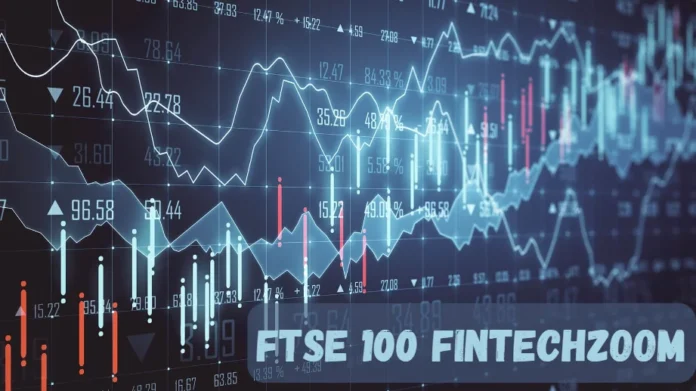The Financial Times Stock Exchange 100 Index, commonly known as the FTSE 100, is a share index that represents the 100 largest companies listed on the London Stock Exchange (LSE) by market capitalization. Known for its stability and reliability, the FTSE 100 is often seen as a barometer of the UK economy. However, as financial technology fintech continues to evolve, its impact on traditional markets like the FTSE 100 is becoming increasingly significant. In this article, we will explore the intersection of the FTSE 100 and fintech, examining how fintech is reshaping investment strategies, regulatory landscapes, and market dynamics.
Understanding the FTSE 100
The FTSE 100 was launched in 1984 and has become a key component of the UK’s financial landscape. It includes well-established companies from various sectors, including finance, healthcare, energy, and consumer goods. Notable constituents include household names such as BP, HSBC, and Unilever. The index is calculated in real-time and serves as a benchmark for investors looking to gauge the performance of the UK stock market.
Composition and Performance
The composition of the FTSE 100 is diverse, with companies typically requiring a minimum free float market capitalization of £4 billion to be included. The index is weighted by market capitalization, meaning that larger companies have a greater impact on its movements. Performance is often correlated with broader economic indicators, making it an essential tool for both domestic and international investors.
Over the years, the FTSE 100 has faced various challenges, including economic recessions, Brexit uncertainties, and the COVID-19 pandemic. However, it has also shown resilience, rebounding from downturns and adapting to changing market conditions.
The Fintech Revolution
Fintech refers to the use of technology to enhance and automate financial services and processes. It encompasses a broad range of innovations, including mobile banking, peer-to-peer lending, robo-advisors, and blockchain technology. The rise of fintech has democratized access to financial services, providing consumers with more options and control over their financial activities.
Key Players in Fintech
Some notable fintech companies have emerged as disruptors to traditional financial institutions. Companies like Revolut, Monzo, and TransferWise (now Wise) have transformed banking experiences, while platforms like Robinhood and eToro have changed the investment landscape by making trading more accessible. These companies leverage technology to offer lower fees, faster transactions, and user-friendly interfaces, appealing particularly to younger generations.
The Growth of Fintech in the UK
The UK has become a global hub for fintech innovation, with London recognized as one of the top fintech cities worldwide. According to a report by Innovate Finance, the UK fintech sector attracted £11 billion in investment in 2020, reflecting the growing appetite for digital financial solutions. This growth is supported by a favorable regulatory environment, access to talent, and a thriving startup ecosystem.
The Intersection of FTSE 100 and Fintech
As fintech continues to gain traction, its influence on the FTSE 100 is becoming more pronounced. Traditional companies are increasingly adopting fintech solutions to streamline operations, enhance customer experiences, and stay competitive in a rapidly changing landscape.
Investment Strategies
One of the most significant impacts of fintech on the FTSE 100 is the evolution of investment strategies. Fintech platforms are enabling investors to access real-time data, advanced analytics, and AI-driven insights. This shift is changing the way investors approach stock selection, portfolio management, and risk assessment.
For instance, retail investors can now use robo-advisors to create and manage their investment portfolios based on their risk tolerance and investment goals. These platforms utilize algorithms to recommend asset allocations, making investing more accessible to those who may not have traditional finance backgrounds.
Trading Innovations
The rise of fintech has also led to innovations in trading. High-frequency trading (HFT) firms are leveraging sophisticated algorithms to execute trades at lightning speed, capitalizing on minute market fluctuations. This has introduced new dynamics to the FTSE 100, as trading volumes and patterns shift with the adoption of technology.
Moreover, social trading platforms allow investors to mimic the trades of experienced investors. This trend is particularly popular among millennials, who seek to learn from seasoned traders while participating in the market. As more retail investors engage with the FTSE 100 through these platforms, market behaviors are evolving.
Regulatory Challenges
The integration of fintech into the traditional financial landscape brings regulatory challenges. Regulators must strike a balance between fostering innovation and ensuring consumer protection. The Financial Conduct Authority (FCA) in the UK has been proactive in addressing these challenges by implementing regulations that promote transparency and fairness in the fintech space.
For example, the FCA has introduced rules to govern the marketing of high-risk investment products and ensure that consumers are adequately informed about the risks involved. As fintech firms increasingly interact with established financial institutions, collaboration and compliance with regulatory standards become paramount.
The Role of Established Companies
Many FTSE 100 companies are recognizing the importance of fintech and are adapting their strategies accordingly. Financial institutions, such as Barclays and Lloyds Banking Group, have invested in fintech partnerships and initiatives to enhance their service offerings. By embracing digital transformation, these companies aim to improve customer experiences and remain relevant in a competitive market.
In addition, established firms are also acquiring fintech startups to gain access to innovative technologies and expertise. This trend is indicative of a broader shift in the industry, where collaboration rather than competition is becoming the norm.
Market Dynamics
The interplay between fintech and the FTSE 100 is not just limited to investment strategies and trading innovations. The emergence of fintech is also influencing market dynamics. As more investors turn to fintech platforms, traditional brokerage firms are facing increased pressure to adapt to changing consumer preferences.
For example, many retail investors are gravitating towards low-cost, user-friendly trading apps, prompting traditional brokers to reevaluate their fee structures and service offerings. This competition is fostering a more dynamic market environment, ultimately benefiting investors through better choices and lower costs.
The Future of FTSE 100 and Fintech
Looking ahead, the relationship between the FTSE 100 and fintech is likely to deepen. As technology continues to advance, the financial landscape will undergo further transformations. Investors can expect to see even more innovative products and services that leverage artificial intelligence, machine learning, and blockchain technology.
Potential Disruptions
While fintech presents numerous opportunities, it also poses risks. The rapid pace of technological change can lead to disruptions in established business models, creating uncertainty for traditional firms. Additionally, cybersecurity threats are a growing concern as more financial activities move online.
Moreover, as the regulatory landscape evolves, fintech companies will need to navigate compliance challenges to maintain consumer trust and market stability. Adapting to these changes will be critical for both fintech startups and established FTSE 100 firms.
Conclusion
The intersection of the FTSE 100 and fintech represents a fascinating evolution in the financial landscape. As fintech continues to disrupt traditional finance, its influence on investment strategies, trading innovations, and market dynamics will only grow. For investors, understanding this relationship will be essential in navigating the complexities of the modern financial ecosystem.
As we move forward, the adaptability of both fintech companies and established firms will determine their success in this rapidly changing environment. The FTSE 100, with its rich history and diverse composition, stands as a testament to the enduring nature of the financial markets. By embracing innovation and collaboration, the FTSE 100 can continue to thrive in an era increasingly defined by technology and fintech.
In this ever-evolving landscape, investors who stay informed and adaptable will be best positioned to seize opportunities as the boundaries between traditional finance and fintech continue to blur.


